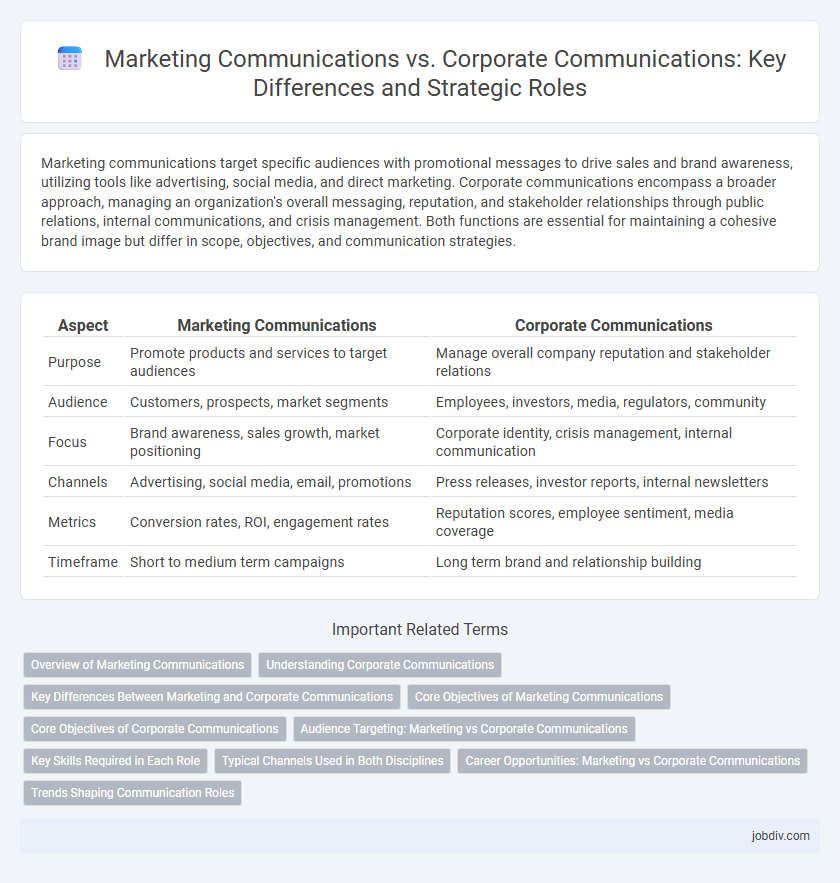Marketing communications target specific audiences with promotional messages to drive sales and brand awareness, utilizing tools like advertising, social media, and direct marketing. Corporate communications encompass a broader approach, managing an organization's overall messaging, reputation, and stakeholder relationships through public relations, internal communications, and crisis management. Both functions are essential for maintaining a cohesive brand image but differ in scope, objectives, and communication strategies.
Table of Comparison
| Aspect | Marketing Communications | Corporate Communications |
|---|---|---|
| Purpose | Promote products and services to target audiences | Manage overall company reputation and stakeholder relations |
| Audience | Customers, prospects, market segments | Employees, investors, media, regulators, community |
| Focus | Brand awareness, sales growth, market positioning | Corporate identity, crisis management, internal communication |
| Channels | Advertising, social media, email, promotions | Press releases, investor reports, internal newsletters |
| Metrics | Conversion rates, ROI, engagement rates | Reputation scores, employee sentiment, media coverage |
| Timeframe | Short to medium term campaigns | Long term brand and relationship building |
Overview of Marketing Communications
Marketing communications encompass strategies and tactics used to promote products or services directly to target audiences, including advertising, sales promotions, public relations, and digital marketing. This discipline aims to build brand awareness, generate leads, and drive consumer engagement through consistent messaging across multiple channels like social media, email, and content marketing. Effective marketing communications integrate market research and customer insights to tailor messaging that maximizes impact and return on investment.
Understanding Corporate Communications
Corporate communications encompass the strategic management of internal and external messaging to build a cohesive brand image and foster stakeholder trust. Unlike marketing communications, corporate communications focus on reputation management, investor relations, crisis communication, and employee engagement. Effective corporate communications align organizational goals with transparent, consistent messaging across all platforms to support long-term business success.
Key Differences Between Marketing and Corporate Communications
Marketing communications focus on promoting products or services through targeted messages aimed at driving sales and customer engagement, utilizing channels such as advertising, social media, and direct marketing. Corporate communications encompass a broader scope, managing the overall brand reputation, internal communication, investor relations, and crisis communication to maintain a positive corporate image. The key difference lies in marketing communications targeting external customers with persuasive messages, while corporate communications engage multiple stakeholders to build trust and convey the company's mission and values.
Core Objectives of Marketing Communications
Marketing Communications primarily aim to promote products or services to target audiences, driving sales and brand awareness through advertising, sales promotions, and direct marketing. Core objectives include creating persuasive messaging that influences consumer behavior and supports market positioning and customer engagement. This contrasts with Corporate Communications, which focus on managing reputation, internal communications, and stakeholder relationships.
Core Objectives of Corporate Communications
Corporate Communications centers on managing an organization's overall reputation, fostering stakeholder relationships, and ensuring consistent messaging across all communication channels. Its core objectives include building trust with investors, employees, and the public, enhancing brand integrity, and supporting corporate social responsibility initiatives. This strategic communication framework differentiates it from Marketing Communications, which primarily targets market promotion and customer engagement.
Audience Targeting: Marketing vs Corporate Communications
Marketing communications target specific consumer segments to drive sales and brand engagement through tailored messages and promotional campaigns. Corporate communications focus on a broader audience including employees, investors, regulators, and the public to maintain corporate reputation and convey organizational values. Effective audience targeting in marketing leverages demographics and behavior analytics, while corporate communications prioritizes stakeholder relations and trust-building across diverse groups.
Key Skills Required in Each Role
Marketing communications require skills in brand messaging, digital marketing, and audience segmentation to effectively promote products and engage customers. Corporate communications demand expertise in crisis management, internal communication, and stakeholder relations to maintain organizational reputation and ensure clear information flow. Both roles benefit from strong writing, strategic thinking, and media relations abilities to achieve their specific communication objectives.
Typical Channels Used in Both Disciplines
Marketing communications primarily utilize channels such as social media, email marketing, advertising, and content marketing to target specific consumer segments and drive sales. Corporate communications rely on internal newsletters, press releases, investor relations, and public affairs channels to maintain the organization's reputation and engage stakeholders. Both disciplines employ websites and events, but their messaging and audience focus differ significantly based on the communication objectives.
Career Opportunities: Marketing vs Corporate Communications
Marketing communications careers often emphasize roles in brand management, digital marketing, and advertising, offering opportunities to develop skills in consumer engagement and data-driven campaigns. Corporate communications careers typically focus on public relations, internal communications, and stakeholder management, providing pathways to senior leadership positions in reputation management and corporate affairs. Both fields present diverse career trajectories, but marketing communications roles tend to be more dynamic and campaign-oriented, while corporate communications careers are centered on strategic messaging and organizational cohesion.
Trends Shaping Communication Roles
Marketing communications increasingly integrate AI-driven personalization and omnichannel strategies to enhance customer engagement and brand loyalty. Corporate communications prioritize transparent storytelling and crisis management, leveraging digital platforms to maintain stakeholder trust and corporate reputation. Both fields adopt data analytics and real-time feedback mechanisms to refine messaging and optimize communication effectiveness.
Marketing Communications vs Corporate Communications Infographic

 jobdiv.com
jobdiv.com